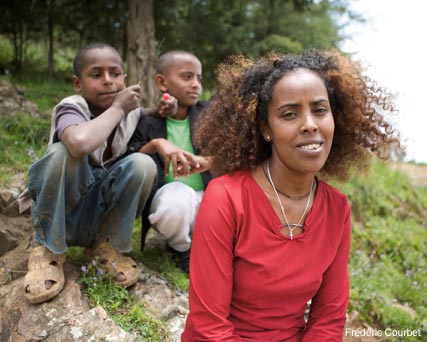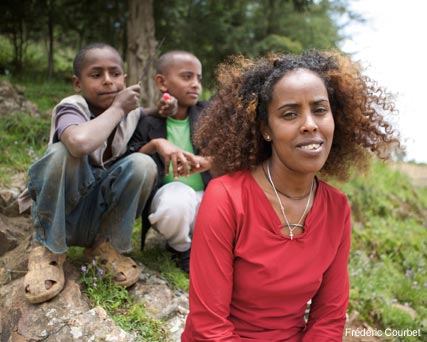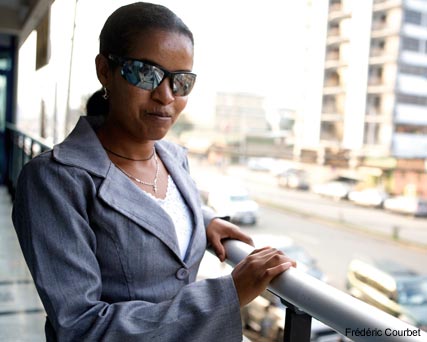Ethiopian Famine: The Orphans' Stories of Survival
25 years after the Ethiopian famine, Angela Robson speaks to four orphaned women with amazing stories of hope and courage.

25 years after the Ethiopian famine, Angela Robson speaks to four orphaned women with amazing stories of hope and courage.
25 years after the Ethiopian famine that shocked the world, the country now faces yet another drought. Angela Robson speaks with four orphaned women whose incredible stories offer courage and hope to the next generation.
BIRTUKAN'S STORY:
Dressed in a crisp cotton blouse and jeans, her long dark hair pulled back in a sleek ponytail, 27-year-old Birtukan Abate bursts into peals of laughter when a waiter who has been staring at her for 20 minutes in a cafe leaves his telephone number on her bill. But a shadow creeps across her face when he asks about her hometown.
Birtukan was born in Amhara Region, northern Ethiopia, one of the areas most affected by the infamous famine that prompted worldwide horror and inspired Bob Geldof to set up Band Aid 25 years ago. Over 1 million people died and tens of thousands of children like Birtukan were left orphaned.
‘Ethiopia is still haunted by that terrible year,' she says. ‘In my village, there were children with swollen stomachs and people deranged with hunger. Everyone was dying, so my parents left with my two older sisters to search for food and water. But they died of malnutrition in a resettlement camp. A few weeks later, I was run over by a car. It was days before I could get to see a doctor. When I finally did, my leg was so infected, it had to be amputated.'
But Birtukan was one of the lucky ones. Picked up and taken to a local orphanage by an aid worker, she is one of the 1,000 children who survived thanks to a small Ethiopian charity: St Matthew's Children's Fund (SMCF), which has children's homes in five regions throughout the country. It funded her through school, where she excelled academically, and provided ongoing financial support so she could train for a profession. Today, she works for the government's education division.
Marie Claire Newsletter
Celebrity news, beauty, fashion advice, and fascinating features, delivered straight to your inbox!
In a country where women's rights are almost unheard of and the average woman can expect to have six children by the age of 25 and die at just 44 - half the life expectancy of a British woman - her story is testament to the strength of the human spirit. Today, proud and independent, she speaks without a shred of self-pity, and is optimistic about the future.
‘Both the good and bad parts of my life are the direct consequences of the famine,' she says. ‘I lost my leg and my family. I used to cry with jealousy and frustration when other children were adopted from the orphanage and wonder why I was never chosen. But the carers at the orphanage taught me to believe in myself. I have a prosthetic limb, but I'm alive. I now have a boyfriend who loves me as I am. It makes me so proud to be able to support myself financially. I could never have imagined things would work out so well.'
TIRSIT'S STORY:
Birtukan's friend Tirsit Wndimu, 27, is equally inspiring. Taking a small black-and-white photo from her wallet, she smiles. ‘I was two and new to the orphanage when this was taken. Now, when I look at it, I find myself searching for traces of my mother and father and wondering if they had my eyes or the same shape nose. I often have the feeling that I am the mother of that little girl in the picture,' she says. ‘I want to stroke her cheeks, comb her soft hair and tell her to be strong, because everything will turn out OK.'
Tirsit, like Birtukan, was born in the midst of the famine and still has no idea what happened to her family. She, too, survived thanks to an orphanage supported by SMCF. She now works full-time for a printing company, but also helps out at a local orphanage.
‘Female genital mutilation is widely practised in my area, as is marriage at 17 years old. But, thanks to the orphanage, I have escaped both and am educated and financially independent,' she says. ‘I think of myself as a survivor.'
Today, 25 years on from the report by BBC journalist Michael Buerk that turned the world's attention to this tragedy, Ethiopia is still one of Africa's poorest countries. Its economy is based on agriculture, which is frequently affected by adverse weather conditions. It has been plagued by droughts and food crises since the famine. Four million children (12 per cent) are currently orphans, with half a million of these having lost their parents to HIV and Aids.
But women who have benefited from the orphanages during the famine are now reaching out to younger generations of orphans to maintain the cycle of hope in a country so full of despair. On the outskirts of the capital, five children sit under a tree, listening to a young woman who is telling them a story...

SOSINA'S STORY:
Sosina Bunara, 27, is part of a new SMCF project to provide accommodation and education for orphans who were previously sleeping rough. Sosina, who herself was an orphan, felt it was important to give something back. ‘I understand a little of what they have been through,' she says. ‘It also helps me deal with my past. There is a stigma attached to being an orphan in Ethiopia. I was ostracized at work and shunned in my community but, together with the other orphaned women, I am trying to stop this prejudice and encourage the children I work with to believe in themselves.'

MULU'S STORY:
Sosina and her friend Mulu Tesgaye, born in 1983, a year before the famine, both volunteer their time. Mulu contracted smallpox and lost her eyesight in the famine, but says she's been able to transform what many would consider a catastrophe into her life's mission. ‘Children with disabilities like mine usually end up begging on the streets,' she says. ‘But the head of the orphanage spent a lot of time with me. She said that, if I had confidence in myself, I could do anything. I believed her.'
The ultimate success story, Mulu graduated in law from Addis Ababa University with first-class honours last summer and is now working as a lawyer. She is keen that other children are inspired by her story of triumph over adversity. ‘Being blind is still considered by many in Ethiopia to be a curse,' she says. ‘But I want to show how someone who has come from nothing can take charge of her fate and be successful against the odds.'
SMCF provides support for disadvantaged Ethiopians through community-led projects. It believes that change can only happen if communities take control of their daily lives and help themselves. Just £4 a month will keep an orphaned child in a foster family and allow them to go to school. To help, visit smcfethiopia.org.
'Don't let this suffering happen again' By Michael Buerk
Michael Buerk first brought the plight of millions of suffering Ethiopians to our TV screens 25 years ago. This February, as drought season is set to strike again, he talks about a country on the verge of crisis.
'In 1984, when the rains failed in Africa for the fifth or sixth time, thousands of people in the Ethiopian highlands, isolated by civil war, were so desperate for food that they were reduced to eating their own sandals. They soon realised they were going to die unless they migrated from the countryside to the main road where aid stations had been set up to supply food. Unlike other natural disasters I'd covered, this had a profound, lasting effect on viewers, because they could see the scale of the tragedy.
On a raw, emotional level, it was an extraordinarily awful experience. I spoke to many Ethiopian women at the centre of family tragedies. One woman had previously lost her husband and, by the time I got to her, all her children had died, too. Twenty-five years on, the population has exploded in Ethiopia, doubling to 80 million, and because of climate change, droughts are becoming dangerously common. The spectre of famine is back, threatening the lives of millions of people, but the good news is we have time to act before it becomes a reality.'
Find out how you can help at actionaid.org.uk/ethiopia
The leading destination for fashion, beauty, shopping and finger-on-the-pulse views on the latest issues. Marie Claire's travel content helps you delight in discovering new destinations around the globe, offering a unique – and sometimes unchartered – travel experience. From new hotel openings to the destinations tipped to take over our travel calendars, this iconic name has it covered.
-
 Penn Badgley and Blake Lively kept their breakup a secret from the Gossip Girl cast and crew - here's what we know about their former relationship
Penn Badgley and Blake Lively kept their breakup a secret from the Gossip Girl cast and crew - here's what we know about their former relationshipBy Jenny Proudfoot
-
 This iconic rose perfume is a compliment magnet—it makes me feel ‘put together’ after just one spritz
This iconic rose perfume is a compliment magnet—it makes me feel ‘put together’ after just one spritzGrown-up and elegant, yet not at all dated.
By Denise Primbet
-
 Spring has finally sprung - 6 best outdoor workouts that are totally free and boost both body and mind
Spring has finally sprung - 6 best outdoor workouts that are totally free and boost both body and mindSoak in the nature and boost Vitamin D *and* endorphins.
By Anna Bartter